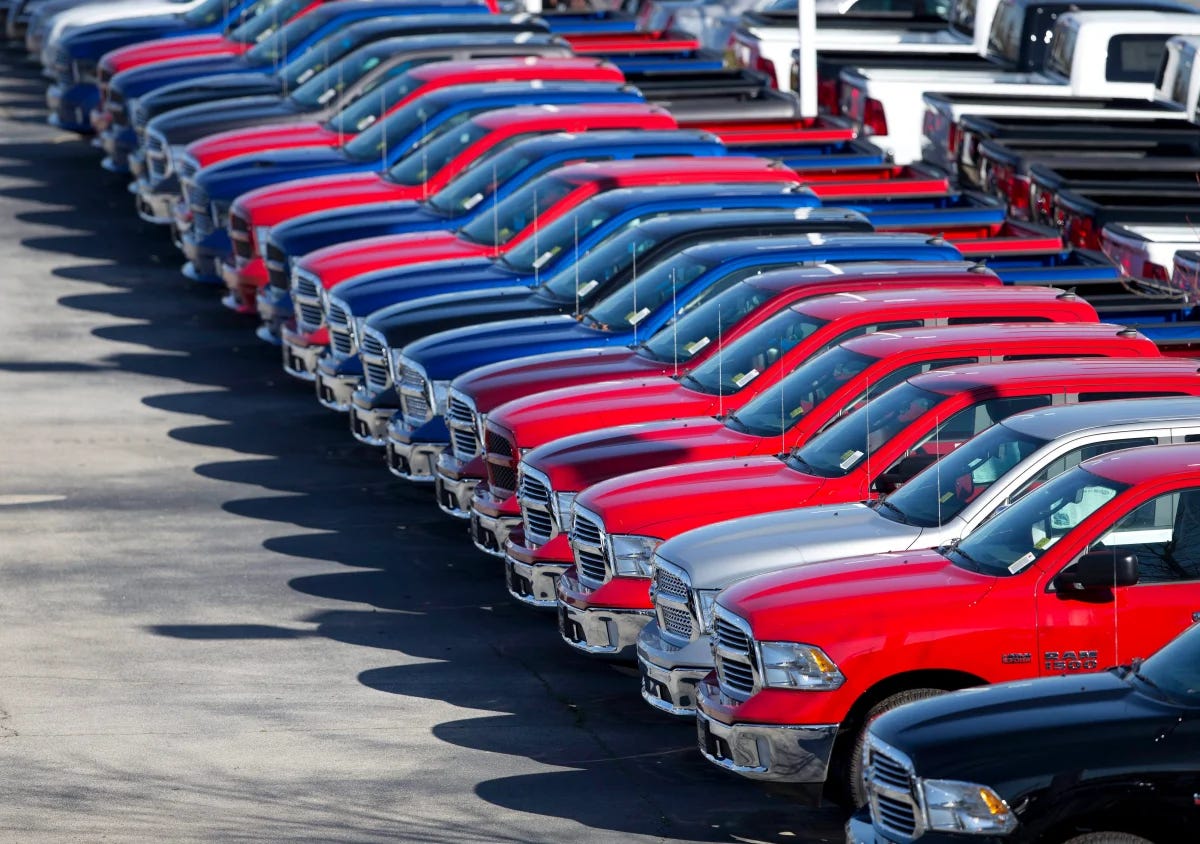Are Pick Up Trucks the Biggest Drain on Rural Economies?
Big box stores get the grief, big banks and big government taxes too, but could big truck sales be the real reason rural communities are in bad times?
The big story here is that, second only to the big banks (and actually in cahoots with them), nothing, I MEAN NOTHING, systematically drains desperately needed capital from a rural region like new truck dealerships.
It's the shortage of capital that gives many the feeling that something is wrong in rural Nova Scotia - the feeling that something is missing - not a shortage of labour or natural resources. Our most talented young labour leaves and our vast natural resources are extracted and shipped off unprocessed, even as many among us struggle to find good work, because we lack capital.
It's capital that's employed to make labour more efficient (the main ingredient of the modern economy) and make better use of our natural resources. It's capital that makes the modern world modern - that enables people to start and grow businesses, to make things better, to live the good life, to be clean and healthy, and - yes - to be 'innovative' and 'bold'. And it is capital that we lack.
It’s not that we’re not producing. The fishery is booming. Across all markets we’re heading toward grossing $4 billion in sales annually. There’s lots of expenses of course. But most of them, from a community standpoint, cycle money around the community, amplifying and increasing that wealth. Local crew, local boatyard, local chandleries and rope sellers, local commercial divers keep up wharves and mooring, local restaurants, all circulate wealth in the community economy.
But if your mission is to get local wealth out of town as fast as possible, maybe even before it’s earned. Get down to the big dealerships monopolizing mainstreet and buy the biggest truck they will sell you. It seems ridiculous. But we see it happen over and over, every time a guy gets a couple bucks in his pocket and a clear credit score.
The car dealerships perhaps even eclipse the big banks because where the banks leave us only with nothing when they electronically zoom our capital to Toronto and beyond, the new car dealers leave us hooked to costs for financing interest, insurance, bills for repairs and maintenance, gas and oil, environmental impacts, difficult disposal, waning assets (new vehicles lose 20% of value in the first year alone, 60% after five years), expensive endlessly costly inefficient infrastructure, and of course the most deadly, socially divisive, personally isolating, machines in the world.
Last year Ford, Dodge, Chevy, GMC, and the rest sold over 2 million new trucks. Sticker prices are heading toward $100,000.00. And that’s just the tip of the iceberg. The global pickup truck market is on track, even with recent interest rate hikes and price increases, to head toward $250 Billion a year.
I love machines, and vehicles in particular, but big auto is the greatest enemy of household wealth, community capital, and provincial prosperity, and the sooner we do the math and face #therealproblem in Nova Scotia the better off we'll be.
How bad is the problem? Imagine Mr. Steele and all the other NS car dealers’ corporate wealth. I don’t fault them. They are actually the good part of the story. The money that stays in the region. Then consider that only about 1/50th or less of the cost of each new car remains in the region and that the negative 'spin-off' value is that much again at least. It's a bombastic, near perfectly efficient, mainstreet based, out-conveyor of wealth, so in our face, so big, and so awfully addicting and overwhelmingly difficult to imagine any alternatives to that nobody talks about it.
What can be done?
It seems silly. In an age where we spend so much effort recycling to lessen land fill, spending on energy conservation programs, conserving water, investing in health promotion, and making laws about light bulbs to save electricity, we almost proudly do nothing, absolutely zero, to conserve our capital. Even the mention of it or any form of activist localism of capital is met with sneers and vague threats powered by some very poor understanding of globalism cleverly branded as ‘free-trade’.
If rural regions are to survive and be places where the good life is possible we've got to find the courage to put at least as much effort into conserving our capital as we do into creating the wealth in the first place.
There’s no one answer. Buying less buying used, keeping vehicles running longer with independent local garages are the quickest and shortest term answers. Going electric is not going to help. Electric may move the capital even farther off shore than the I.C.E. industry. Maybe the most we could hope for is building locally needed vehicles locally. It may seem crazy in the current industry, but it was only 100 years ago there were 100x local vehicle manufacturers.
The current industry, famously following Ford’s factory model, is built on the notion of efficiency. And efficiency is definitely important when things are desperately inefficient. But efficiency is not the only thing we care about. The biggest mistake in economics, Hazlit famously wrote in Economics in One Lesson, is taking to narrow a view for one group in a short time frame rather than what’s economically best for everyone in the long run.





